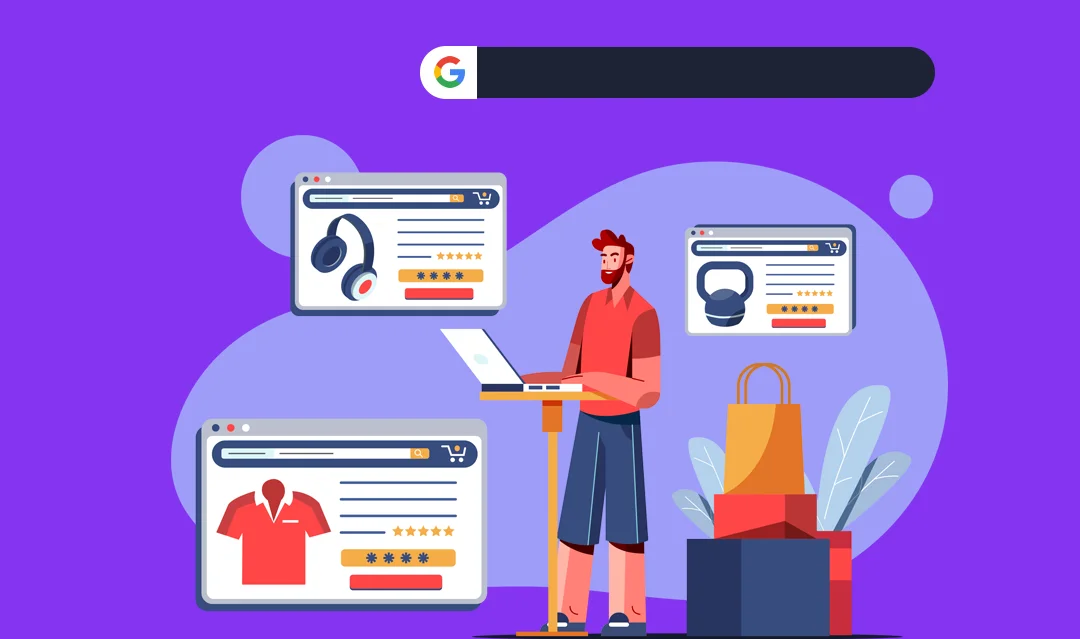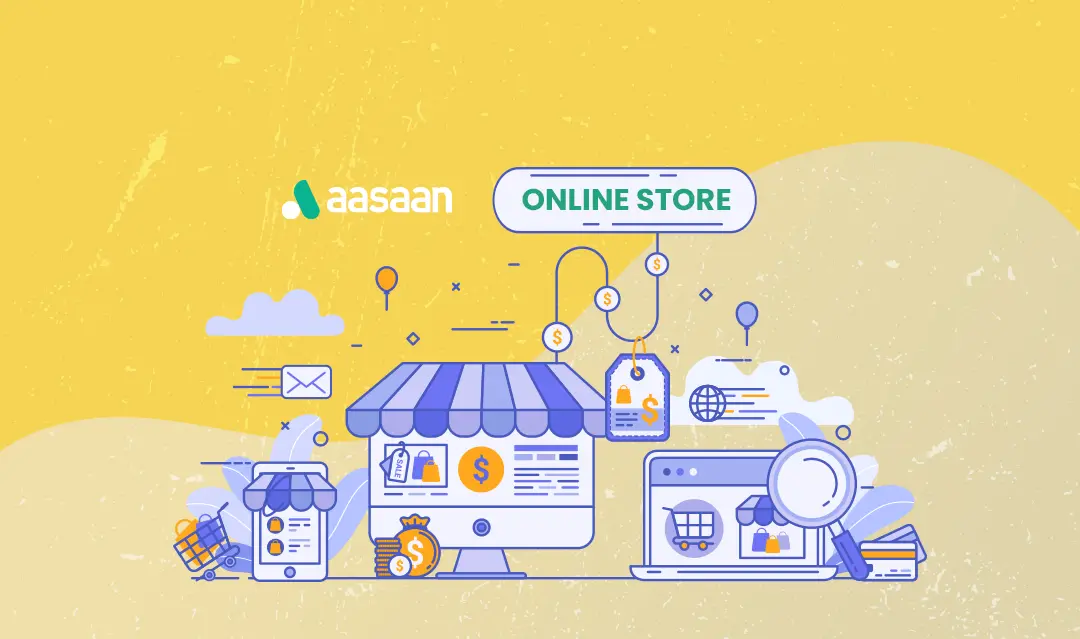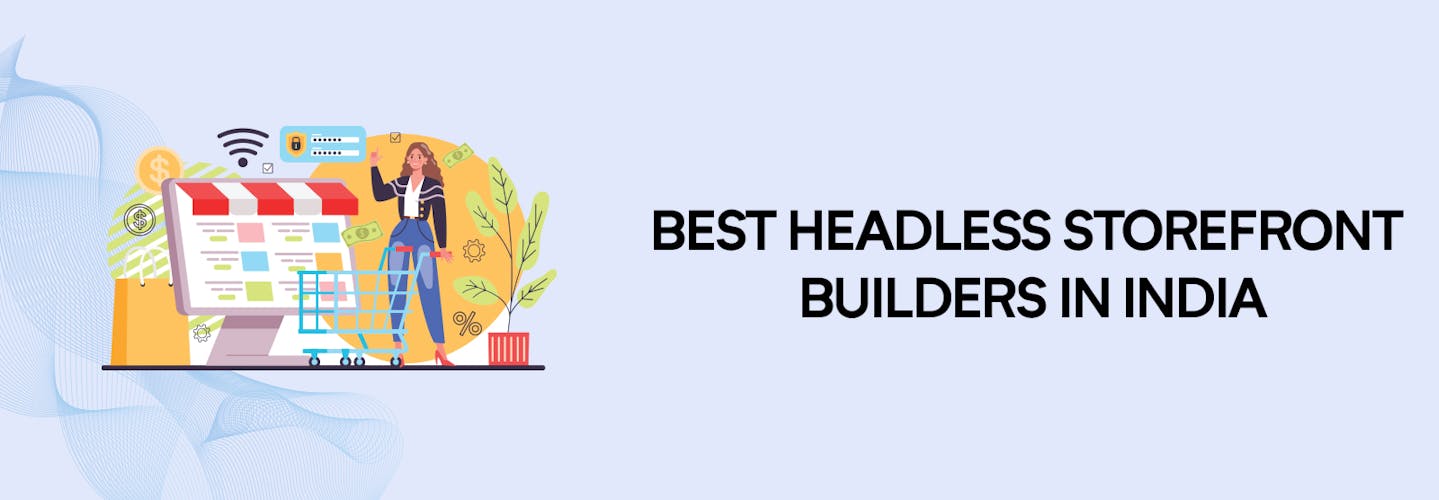
Top 8 Online Headless Storefront Builders in India
Are you on the hunt for the perfect solution to elevate your business in the digital world?
Looking for a unique approach that sets you apart from the crowd? Have you considered the power of headless storefront builders?
Welcome to our guide on the “Top 8 Online Headless Storefront Builders in India”. This article is designed to help you navigate the world of headless ecommerce, a revolutionary approach that’s taking the online business world by storm.
Why headless, you ask? It’s all about flexibility, customization, and speed. With a headless storefront, you can create a unique, seamless shopping experience for your customers, tailored to your specific business needs.
Intrigued? Let’s dive into the world of online headless Commerce builders and discover how they can transform your business.
Stay tuned!
What is a Headless Storefront?
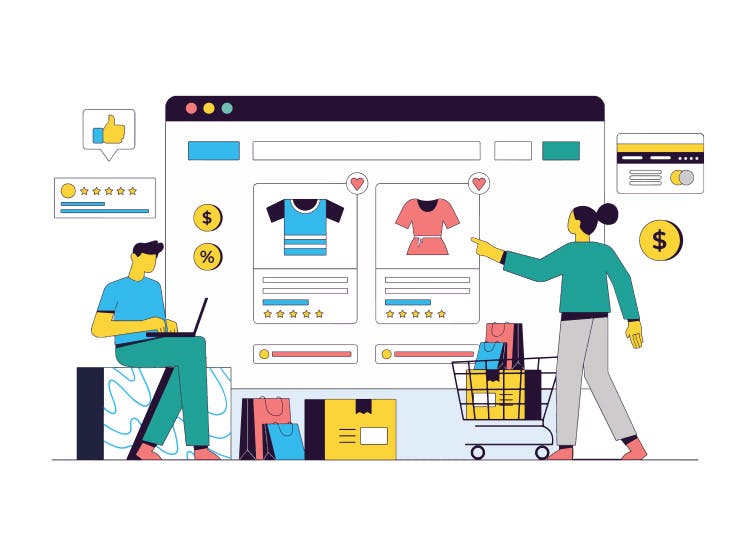
A headless storefront is an ecommerce solution that decouples the frontend presentation layer from the backend system, allowing for greater flexibility and customization in the design and functionality of the website.
This enables businesses to create engaging, agile, and fast-loading online stores tailored to their specific requirements and audience.
Now that you have an understanding of what a headless storefront is, let’s explore the top 8 providers in India.
Top 8 Headless Storefront Builders in India
1. Aasaan - API First Headless commerce builder
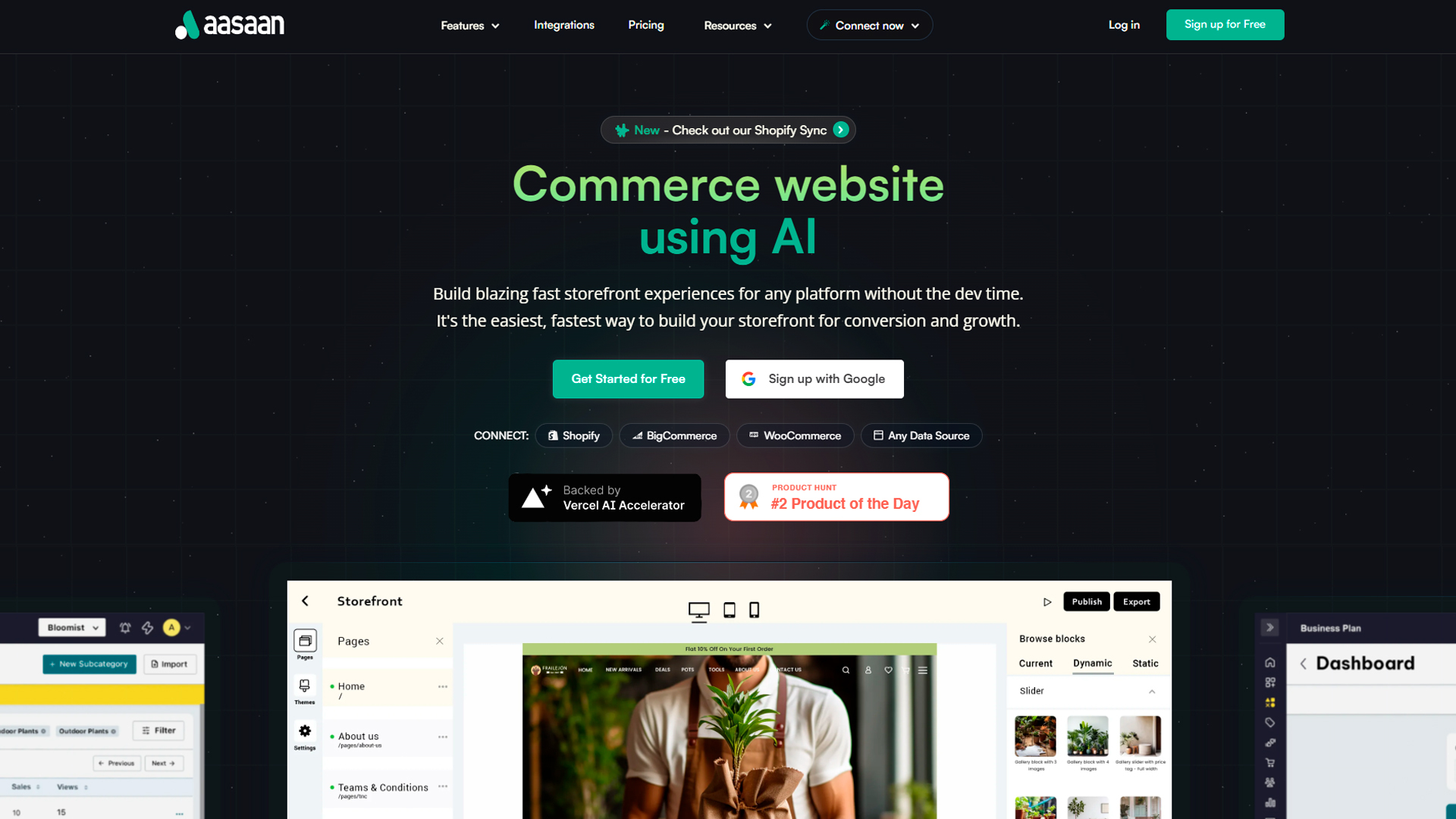
Aasaan Commerce is an emerging player in the Indian headless commerce landscape, known for its user-friendly platform and exceptional customer support.
The solution offers a range of tools and resources to help businesses of all sizes build customizable and optimized online shopping experiences.
Key features:
- Seamless Integration: Aasaan can easily integrate with your existing backend or you can start with their API-first commerce platform to harness the power of top-tier technology within seconds.
- Build with Drag & Drop: Aasaan provides a visual building platform for your headless store. You can use their building blocks to create bespoke experiences from scratch, giving you control over the customer journey and shopping experiences without relying on developers.
- Manage Your Business: With Aasaan, you can manage all aspects of your business from a single admin app. This includes managing orders, fulfillments, customers, inventory, payments, and more.
- Seamless Integrations: Aasaan allows you to expand the capabilities of your headless store with tools you love to enhance your customers’ shopping experience and boost your business growth. You can also leverage their API to write your own integrations.
- Multi-Channel Marketplace: Aasaan supports multi-channel experiences, allowing you to integrate various sales channels, such as mobile apps, websites, and marketplaces, providing a unified customer experience across multiple touchpoints.
- Global Reach: Aasaan allows businesses to manage local markets, shipping, and currency conversion seamlessly, making it simple to expand your ecommerce store to new regions or markets.
- Lightning-Fast Site Speed: Aasaan promises a 70% increase in site speed, ensuring a seamless shopping experience for your customers.
- Boost Your Conversion Rates: With Aasaan, businesses can witness a remarkable 38% uplift in conversion rates, maximizing their sales potential.
- Elevated Average Order Value: Aasaan helps businesses enjoy a 20% surge in average order value, driving higher revenue per transaction.
Pricing:
- Premium plan: For merchants and startups to help grow business with branding. It costs $50 per month if billed annually or $65 per month if billed monthly.
- Business plan: Enables advanced merchants with advanced features. It costs $165 per month if billed annually or $200 per month if billed monthly.
- Enterprise plan: Unlimited scalability, greater control, and dedicated resources for D2C brands to scale. It requires you to contact sales for a custom quote.
Reviews:
Aasaan Commerce has garnered positive reviews from its users for its robust platform and top-notch customer support service.
Users have praised the ease of integration, the ability to build custom shopping experiences, and the overall improvement in site performance.
Some users have mentioned the need for more templates and themes, but We are continually working to enhance our product offering.
However, for a more unbiased review, it’s recommended to check out customer reviews on platforms like G2.
2. Commerce Layer
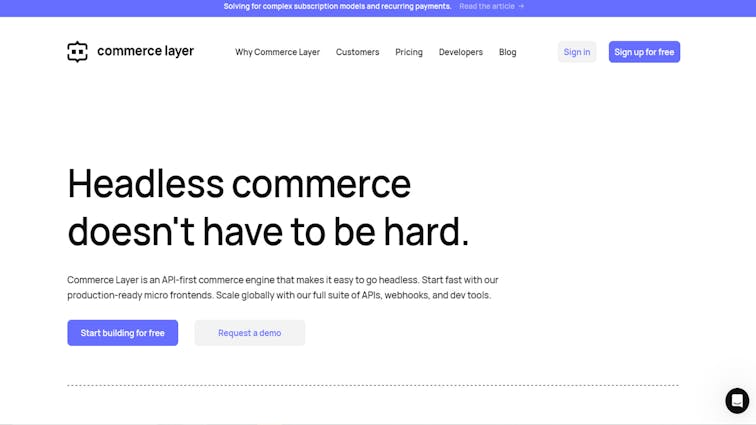
Commerce Layer is a popular, API-first commerce platform that combines flexibility, scalability, and high performance. With its headless architecture, it allows you to build custom and seamless shopping experiences across various platforms.
Commerce Layer not only caters to the Indian market but also serves a global clientele, with numerous businesses benefiting from its technology and features.
Key features:
- API-first Approach: Commerce Layer is built on an API-first architecture, providing businesses with the freedom to create fully customizable and unique online shopping experiences for their customers.
- Omni-channel Commerce: Commerce Layer excels in handling multiple storefronts for your business, whether it be web, mobile, social media, or even brick-and-mortar.
- Global Reach: Commerce Layer allows businesses to manage local markets, shipping, and currency conversion seamlessly, making it simple to expand your ecommerce store to new regions or markets.
- Flexible Integrations: Easily integrate your favorite third-party tools such as PIM, CRM, and CMS systems with Commerce Layer to extend its capabilities.
- Quick Deployment: With Commerce Layer, you can launch your headless store in record time, owing to its fast deployment capabilities and pre-built integrations.
Pricing:
- Developer Plan: This is free and includes access to all features with no time constraints. It allows for 1 organization, 2 users, 1,000 SKUs, 2 markets, and includes 100 orders/month. Any extra orders are charged at $0.90 each.
- Growth Plan: This costs $649/month and provides more resources for scalability. It allows for 2 organizations, 5 users, 10,000 SKUs, 5 markets, and includes 1,000 orders/month. Any extra orders are charged at $0.80 each.
- Enterprise plan: Designed for enterprises with high-end requirements. Contact sales for a customized quote.
Reviews:
Commerce Layer has received positive feedback from users for its advanced features, superior performance, and reliability. Users appreciate the platform’s flexibility and ease of integration with commonly used systems.
Some customers have reported that initially navigating the dashboard can be challenging and the learning curve might be steep, but the detailed documentation and responsive customer support make up for it.
To make the most informed decision, don’t forget to check out user reviews on sites like Capterra to get a broader perspective.
3. BigCommerce
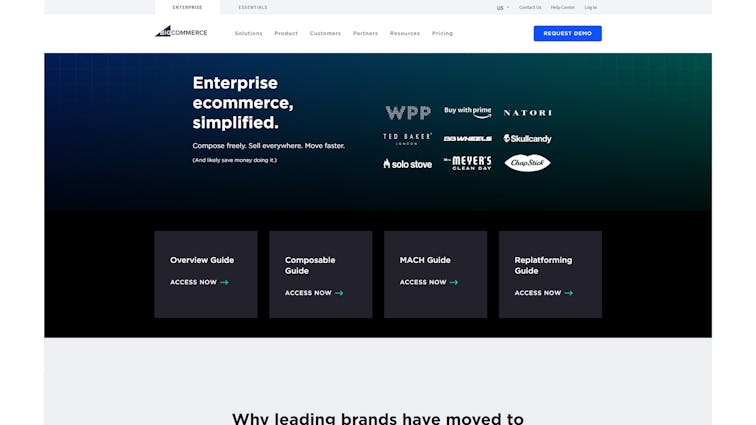
BigCommerce, a well-known eCommerce platform, now offers headless commerce solutions, enabling businesses to customize their online stores for better performance and improved customer experience.
Key features:
- Flexible Headless Architecture: With BigCommerce’s headless architecture, businesses have the freedom to create custom shopping experiences independent of their frontend website, using BigCommerce as their backend system.
- Multiple Platform Integrations: Connect BigCommerce to various CMS, digital experience platform (DXP), and front-end web development tools like WordPress, Magento, etc., to maximize its functionality and adapt according to your preferred platform.
- Seamless Integration: BigCommerce enables you to connect your existing front-end storefront with its API to incorporate shopping cart and checkout functionality seamlessly.
- Multi-channel Selling: Manage your entire product catalog centrally and syndicate them across different popular marketplaces and sales channels to reach a wider audience and boost sales.
- Extensive App Marketplace: BigCommerce provides access to a vast range of third-party apps and integrations, making it easy to extend your store’s functionality without the need for custom development.
Pricing:
Big commerce Offers four pricing tiers: Standard ($29.95/month), Plus ($79.95/month), Pro ($299.95/month), and Enterprise (custom pricing).
Additional charges may apply for certain app integrations, premium account services, and increased sales volumes, depending on the chosen plan.
Reviews:
BigCommerce has earned a solid reputation for its comprehensive feature-set, user-friendly interface, and reliable customer support. Users appreciate the wide range of integrations available and the customizability that comes with the headless commerce solutions.
However, some users have reported limitations in product option configurations, and the occasional slow response time from support, but these concerns are minimal compared to the overall functionality and performance offered.
For a balanced perspective, it is advised to explore customer reviews on popular platforms like Trustpilot for deeper insights into users’ experiences and satisfaction.
4. Shopify Plus
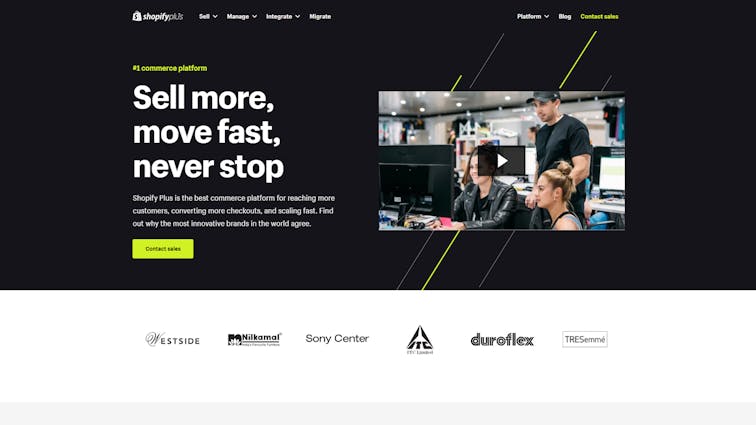
Shopify Plus, the enterprise edition of Shopify, brings headless commerce capabilities to the mix. It allows you to create a highly customizable and scalable eCommerce platform tailored for your business, improving customer experience and conversions.
Key features:
- Headless Commerce Functionality: With Shopify’s headless commerce capabilities, you can break free from the limitations of traditional templates and create unique shopping experiences that suit your business requirements.
- Support for Multiple Frontends: Use Shopify’s robust APIs to connect your back-end system with any desired front-end platform or digital experience tools, enabling independent customization and control of both customer-facing and back-end operations.
- Strong API Suite: Benefit from Shopify Plus’s extensive API catalog, including GraphQL and RESTful APIs that enable seamless integrations and interactions with third-party tools and frontend platforms.
- Easy Inventory & Order Management: Centralize your inventory management and syncing across all channels, making it easier to fulfill orders and monitor your business progress.
- Global Expansion: With Shopify Plus, take advantage of native international market support, currency conversion, and multiple sales channels to grow your business and reach new audiences.
Pricing:
Shopify Plus pricing starts at $2,000/month (with custom pricing for higher volume businesses). Additional costs for specific apps or integrations may apply depending on your requirements.
Reviews:
Shopify Plus has received widespread acclaim for its comprehensive feature set, reliability, and ease of use. Users appreciate the platform’s flexibility, headless commerce capabilities, and the wide range of integrations available that enhance their eCommerce experience.
However, some customers have experienced limitations with the default themes and possible costs related to advanced customization. Nonetheless, the overall functionality and performance provided often outweigh the negatives.
For a comprehensive understanding of user experiences, consider exploring customer reviews on platforms like G2 to better gauge the satisfaction levels among users.
5. Elastic Path
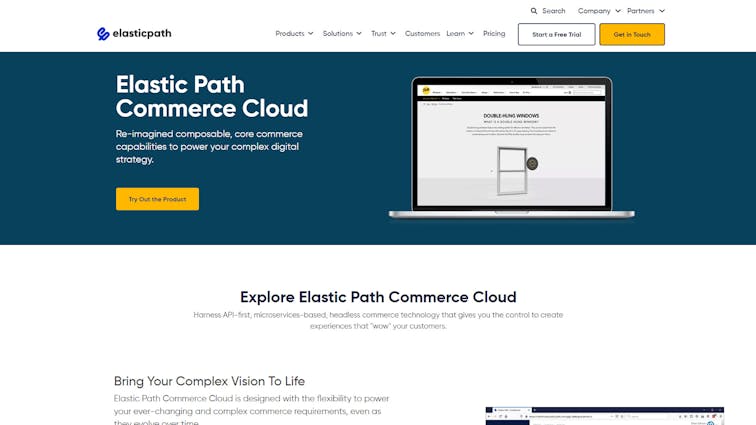
Elastic Path is an API-first, headless commerce solution built to empower businesses and developers with flexibility and control over eCommerce environments.
Key features:
- API-first Architecture: Elastic Path has designed its platform with an API-first approach, ensuring seamless integration with other systems and tools, resulting in rapid customization and adaptability for your eCommerce strategy.
- Headless Commerce Support: Break free from traditional template limitations and take advantage of Elastic Path’s headless commerce capabilities, enabling complete customization and innovation when creating unique shopping experiences tailored to your business needs.
- Microservices Structure: With Elastic Path’s microservices-based architecture, you can independently scale, upgrade, and modify particular site components without disrupting the overall functionality or causing a complete website overhaul.
- Global Reach: Utilize native multi-language and multi-currency support to expand your eCommerce business in diverse geographic markets and tap into a wide range of potential customers.
- Composable Commerce Experience: Elastic Path allows you to select and combine different components, features, and services to create a highly bespoke and modular eCommerce platform that aligns perfectly with your unique business needs and requirements.
Pricing:
Elastic Path offers custom pricing for its services based on your business requirements. You’ll need to contact the company for a personalized quote.
Reviews:
Elastic Path’s robust set of features, headless commerce capabilities, flexibility, and adaptability provided by the API-first approach and microservices architecture is generally praised by its users.
Customers have found that the platform’s functionality can greatly improve their eCommerce strategy and overall shopping experience.
However, some users have mentioned that there may be a challenging initial learning curve or complexity when getting started with the platform, especially for those less familiar with APIs and development.
Despite these challenges, the adaptability and customizable nature of the platform are usually worth the investment for businesses seeking to create tailored eCommerce experiences.
For a well-rounded understanding of the user satisfaction with Elastic Path, consulting customer reviews on platforms like Capterra can give you essential insights and perspectives from their experiences.
6. Magneto Adobe commerce
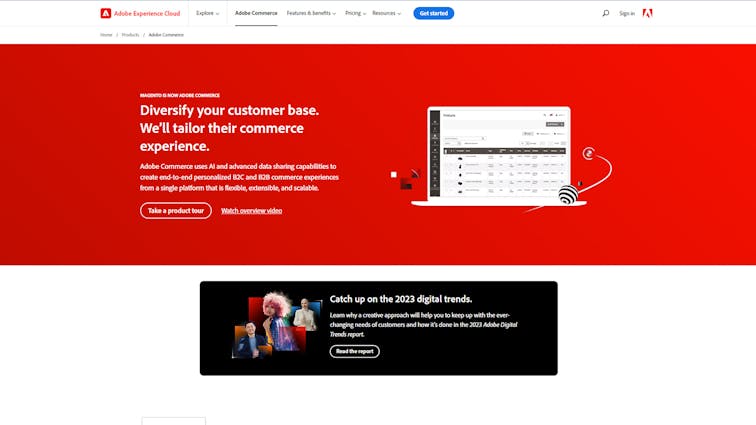
Magento Adobe Commerce is an advanced and highly customizable eCommerce platform designed for enterprises, offering a comprehensive suite of features and tools. This solution enables businesses to grow and scale smoothly, all while delivering an enhanced customer experience.
Key features:
- Scalable Architecture: Magento Adobe Commerce is built on a modern, modular architecture that allows businesses to scale effectively as they continue to grow, minimizing disruptions and the need for complete overhauls.
- Robust Integrations: Seamless integration capabilities with popular CRMs, ERPs, and custom applications make Magento Adobe Commerce an adaptable platform for a wide range of businesses and industries.
- Strong API Suite: The platform’s strong API suite, offering both RESTful and GraphQL APIs, allows you to optimize your integrations with third-party tools, platforms, and services, providing tremendous flexibility in your eCommerce ecosystem.
- User-Friendly Content Management: Enjoy a rich set of content management features and tools, making it easy to create and manage your website’s content with intuitive drag-and-drop capabilities.
- B2B Native Support: Magento Adobe Commerce supports native B2B functionality, including advanced pricing and catalog management, corporate account management, multiple storefronts, and quick and easy reordering to improve both customer and business efficiency.
Pricing:
Magento Adobe Commerce offers custom pricing tailored to your business needs and requirements. To receive an accurate price quote, you’ll need to contact the company or an authorized system integrator.
Reviews:
Magento Adobe Commerce is praised by users for its powerful feature set, customizability, and scalability, particularly for businesses with larger needs and growing enterprises. The platform is also favored for its robust native B2B capabilities, wide range of integrations, and user-friendly content management tools.
However, some users have reported a noticeable learning curve, and the platform may demand more technical expertise, especially during customization and onboarding processes. Despite these challenges, businesses that invest time and resources into mastering Magento Adobe Commerce usually find that they benefit from the exceptional scalability and functionality offered by the platform.
To gain a deeper understanding of user experiences and satisfaction, it’s worthwhile to explore customer reviews on sites like TrustRadius and G2. These platforms can provide essential insights and perspectives from real users who have worked with Magento Adobe Commerce.
7. Spryker
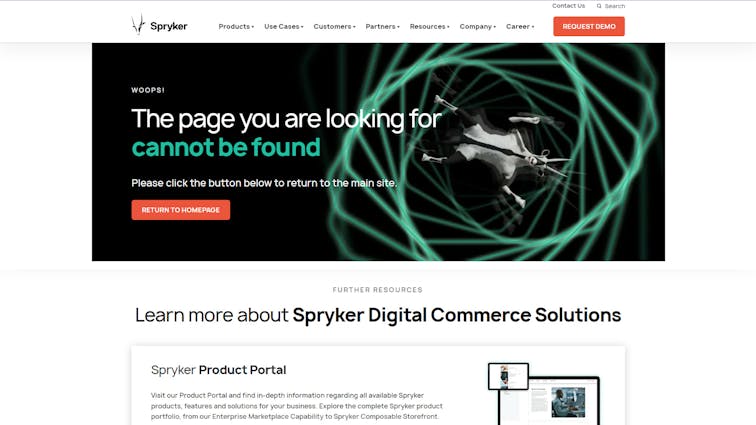
Spryker is a cutting-edge headless commerce platform that caters to ambitious businesses aiming to create seamless and personalized online shopping journeys for their customers. Its modular architecture allows for rapid adoption of new technologies and trends.
Key features:
- B2B and B2C Commerce: Spryker offers solutions tailored for both B2B and B2C commerce, providing a versatile platform for various business models.
- Enterprise Marketplace: Spryker’s enterprise marketplace solution allows businesses to create a comprehensive marketplace with multiple vendors and products.
- Unified Commerce: Spryker’s unified commerce solution provides a seamless shopping experience across various channels, improving customer engagement and satisfaction.
- Headless Commerce: Spryker supports headless commerce, allowing businesses to separate the frontend and backend of their ecommerce platform for greater flexibility and customization.
- PaaS+ Cloud: Spryker’s PaaS+ Cloud solution provides a robust and scalable platform for businesses to build their ecommerce solutions.
Pricing:
Spryker offers custom pricing tailored to each business’s unique needs and requirements. To receive a personalized quote, you’ll need to contact the company and discuss your project details.
Reviews:
Spryker receives positive feedback from users for its modular design, headless commerce capabilities, flexibility, and the customization it offers. Its enterprise marketplace and unified commerce solutions are highly praised by businesses seeking a versatile integrated platform to serve their customers effectively.
However, some users have experienced challenges during the initial setup or onboarding process and indicated that their teams may require technical know-how to fully capitalize on the platform’s capabilities.
Nevertheless, users generally find Spryker’s wide range of features and adaptability advantageous to achieving their eCommerce goals.
To gather more information and gain a better understanding of user satisfaction, it’s recommended to visit review sites like G2. These platforms offer valuable insights and perspectives from customers who have utilized Spryker for their eCommerce needs.
8. Orocommerce
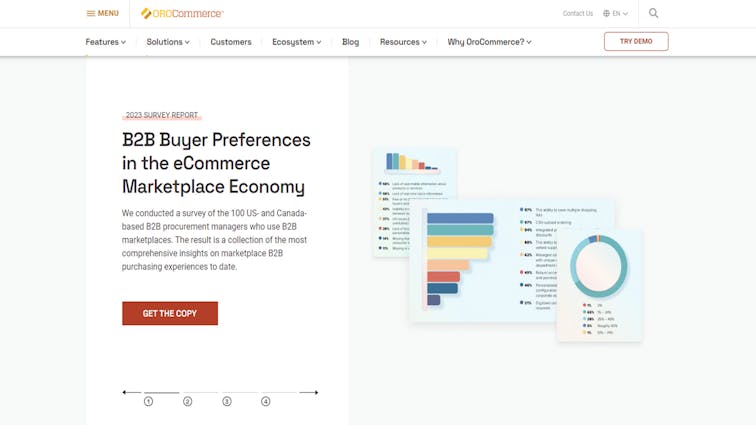
OroCommerce is a flexible and fully customizable open-source B2B eCommerce platform designed to help businesses drive growth, streamline operations, and create seamless omnichannel shopping experiences for their customers.
Key features:
- Feature-Rich Catalog & Inventory Management: Take advantage of OroCommerce’s comprehensive catalog and inventory management features to easily manage products, pricing, inventory levels, and content visibility.
- Multi-Channel Marketplace: OroCommerce supports multi-channel experiences, allowing you to integrate various sales channels, such as mobile apps, websites, and marketplaces, providing a unified customer experience across multiple touchpoints.
- Customizable Workflows: Implement customizable workflows to streamline business processes and automate critical tasks, improving overall operational efficiency and productivity.
- Seamless Integration with OroCRM: OroCommerce integrates with OroCRM, providing powerful customer relationship management tools to drive customer retention and increase overall satisfaction.
- Open Source Community: OroCommerce is built on an open-source approach, offering complete code transparency, greater product reliability, and tested security advantages for both cloud and on-premise deployment.
- eCommerce and ERP Synchronization: OroCommerce can connect with any ERP system to fully digitize your supply chain. This allows you to coordinate your eCommerce store with your business operations and automate inventory management, order management, pricing calculations, and shipping logistics.
- One Platform for B2B, B2C, and B2X: OroCommerce can address all B2B, B2C, and B2X (B2B2B, B2B2C, etc.) scenarios and business needs in a single platform. It supports any business-to-business eCommerce model from self-service websites and quote-to-order portals to marketplace management.
Pricing:
OroCommerce offers a free Community Edition (CE) and a premium Enterprise Edition (EE). To receive custom pricing for the Enterprise Edition, you’ll need to contact the company and discuss your specific business requirements.
Reviews:
OroCommerce is highly regarded by users for its B2B-specific features and functionality, seamless integration with OroCRM, and customizable workflows, which help businesses automate and streamline their operations.
Users also appreciate the platform’s multi-channel marketplace support and unified customer experiences across different touchpoints.
On the other hand, some users report a steep learning curve and the need for technical expertise to harness OroCommerce’s full capabilities.
However, once customers become familiarized with the platform, they typically find that its comprehensive B2B features and robust toolset enable their businesses to thrive in the eCommerce landscape.
For more user insights and perspectives, visit review platforms such as G2. These sites provide valuable information from real users of OroCommerce, helping you gain a better understanding of their experiences and level of satisfaction with the platform.
Ready for the E-Commerce Transformation? Get Started with Aasaan Today!

Take the leap and transform your e-commerce business into a force to be reckoned with. Visit: aasaan.app now to embark on your journey of success with Aasaan.
For more insight into how aasaan can fit into your workflows, go ahead and schedule a demo!
Want to learn more about headless commerce?
Explore our expertly crafted guide to headless commerce, offering a complete introduction, comprehensive overview, and valuable insights.
Dive into the world of headless commerce and unlock its countless benefits for your company.
Conlcusion:
In conclusion, choosing the right e-commerce platform for your business is a crucial decision that can significantly impact your growth and success.
These eight established platforms showcase the diversity of options available to businesses of all sizes and industries.
Before making a decision, it is essential to consider your business needs, budget, and technical requirements, along with the feedback and experiences of real users.
By weighing the pros and cons and understanding the unique features each platform offers, you can confidently select the best e-commerce solution that aligns with your objectives and propels your business towards long-term prosperity.
Remember, there’s no one-size-fits-all platform, so choose the one that empowers your e-commerce ambitions and supports your organization’s overall growth and success.
FAQ’s:
1. What is the best way to evaluate eCommerce platforms for my business?
When evaluating eCommerce platforms, look for features and functionality that align with your business needs, such as scalability, customization options, integration with existing software, and available support. You can also consider reading reviews from real users, evaluating pricing and different editions offered by the platform, and comparing individual features.
2. How important is an open source approach to eCommerce platforms?
Open-source eCommerce platforms offer flexibility, customization, and transparency. Access to source code allows tailored adjustments and extensions. A vibrant community ensures reliable, secure development and support. Consider technical expertise and resources for a steeper learning curve and increased maintenance.
3. What are the main differences between B2B and B2C eCommerce platforms?
B2B eCommerce platforms serve businesses selling to other businesses, while B2C platforms serve businesses selling directly to consumers. B2B platforms provide customizable pricing, volume discounts, product hierarchies, and ERP integration. B2C platforms prioritize user-friendly design, simplified checkout, marketing tools, and customer experience.
4. How can I determine the scalability of an eCommerce platform?
Scalability in an eCommerce platform means it can adapt and grow alongside your business. Look for flexible infrastructure, robust APIs, resource management, and support for multiple stores and domains. Consider its ability to handle larger catalogs, increasing customer and order volumes, and integrations with CRM, ERP, and CMS systems. Evaluate performance optimization and cost-effectiveness as your business expands. Case studies of successful scaling in your industry offer valuable insights.
5. Why is headless commerce called headless?
Headless commerce is called “headless” because it separates the front-end (or “head”) of an e-commerce platform from the back-end. In a traditional e-commerce setup, the front-end and back-end are tightly coupled, meaning they are interconnected and dependent on each other. However, in a headless architecture, the front-end is decoupled from the back-end, allowing businesses to use different technologies or frameworks for each component. This separation gives businesses more flexibility, scalability, and the ability to deliver seamless shopping experiences across multiple channels and devices.



